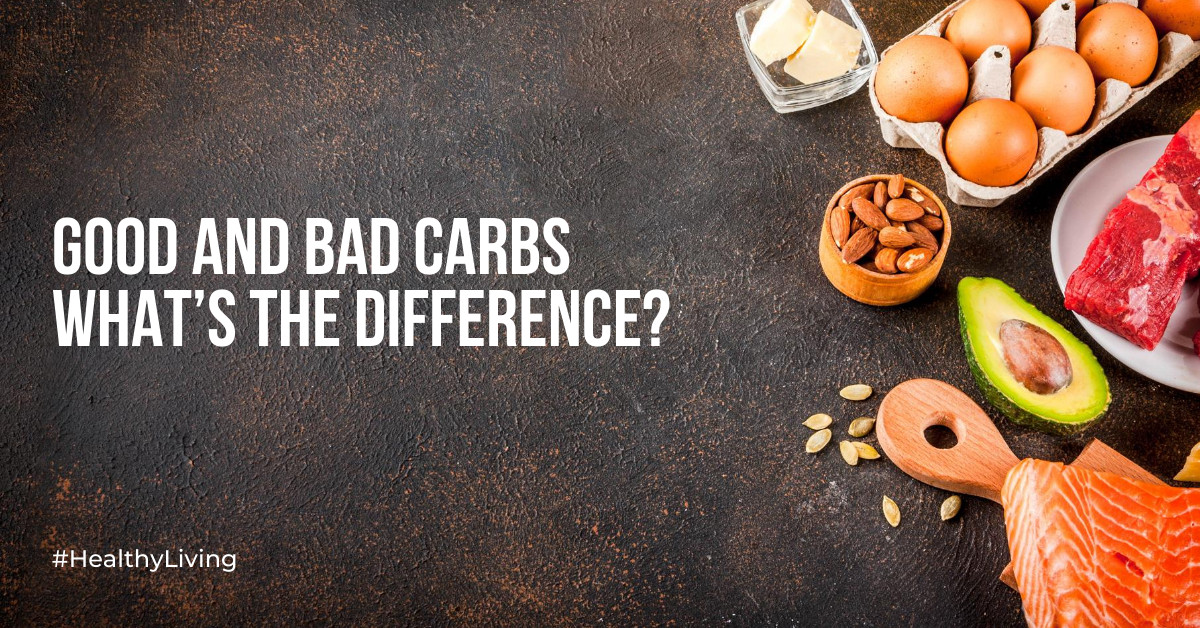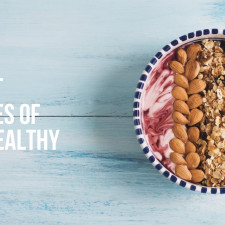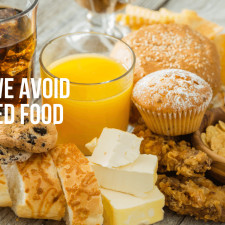Good and Bad Carbs - What’s The Difference?
Ah, carbs! You either love them or fear them (and still secretly love them).
Many fad diets and ‘experts' give carbohydrates a bad name, leaving you to believe that they're the devil causing you to gain weight and other problems. They make you feel guilty when you eat them.

I’m here to tell you - carbs are an essential part of any healthy diet. Not only you need carbs to perform at your peak every day, but new research also confirms that eating the right ones (aka good carbs) can help keep you healthy and vital - which means lesser doctor's visits — and even help prevent weight gain, fatigue, and feeling sluggish.
So instead of looking at a bowl of hearty whole-wheat pasta or brown rice as a big sin, see it as the best source of healthy fuel for your entire body.
What are bad carbs?
Ok, maybe ‘bad’ is not the right word to describe this group. It's better to call them ‘simple carbs’ or ‘refined carbs’.
These carbs are broken down faster, which usually causes spikes in your blood sugar, and they contain fewer vitamins, minerals, fiber, and other important phytonutrients than complex (aka good) carbs do.
However, there’s an exception: Simple carbs, along with fructose and lactose, are also found naturally in whole fruits and dairy products. Fruit also contains dietary fiber, which feeds the good bacteria in your digestive system. Your health starts in your gut! I’m struggling (and addressing) gut issues myself. But that's for another blog.
Ok, what happens when you overeat on simple carbs?
Excellent question! According to a review published in August 2012 in the journal Food and Nutrition Research
- You will gain weight. The authors compiled and reviewed 50 studies on diet and weight gain and found that, on average, the more simple carbs a person ate, the more weight they tended to gain.
What are some sources of simple carbs? As I already mentioned, simple carbs are found in fruit and dairy products, as well as highly processed or refined foods that have been stripped of fiber, including:
- White bread
- Pastries
- Sugary soda and other drinks
- Fruit juices
- Candy bars
- Ice cream
I bet you can think of more simple carbs, once you think about it.
What are good carbs and why do we need them?
Good carbs are everything that ‘bad carbs’ are not. Well, that's a very simple answer. Please allow me to explain in more detail what good (complex) carbs do for you and your body.
Good carbs digest slowly, hence they help you regulate your blood sugar levels and deliver energy and the feeling of vitality more steadily.
They produce good bacteria in your gut and assist and improve your digestion. Because of the fiber content, they control your appetite by making you feel full.
Good carbs also help to remove toxins from your body, because fiber binds toxins in the gut and expels them. Yes, I’m talking about good bowel movements.
Another reason why we need good carbs is to synthesize neurotransmitters in our bodies. Simply explained, neurotransmitters are the chemical messengers made by our bodies, such as serotonin for sleep and mood.
What are some sources of complex carbs?
According to the Harvard T. H. Chan School of Public Health, the top dietary supply of complex carbs can be found in:
- unprocessed or minimally processed whole wheat grains, like barley, bulgur, rye, buckwheat, quinoa, spelt, millet, amaranth, cornmeal, kamut and oats
- whole-wheat and other whole-grain bread
- brown and wild rice
- whole-wheat pasta
- sweet potato
- black beans, lentils, chickpeas, and dried peas
- whole-grain cereals, like 100-percent bran
Which one is your favorite? Mine is sweet potato french fries prepared in my awesome air-frier!
How much carbs should I eat daily?
Ok, I’m going to be honest with you about this question. I don't have a definite answer for you.

According to the U.S. Department of Agriculture (USDA) 2015–2020 Dietary Guidelines for Americans, ‘45 to 65 percent of your daily calories should come from carbohydrates’.
So taking this guideline into consideration, if you eat 2,000 calories a day, 900 to 1,300 calories should come from eating carbs.
But…… this is not written in stone. You need to see what works for you, pay attention to how your body reacts to certain amounts.
I teach my clients how to eat a balanced diet that includes everything (carbs, sweets, alcohol) and how to tweak it to suit their bodies’ needs.
What happens if I don't eat enough carbs?
First of all, if you want to live a vital life, you need to eat a balanced diet.
If you don't get enough of any of the food groups, you run the risk of depriving your body of the calories and essential nutrients it needs. And you will find a way to fill that ‘deprivation’. And as you know by now, it's never something healthy.
Ok, back to carbs. If you don't eat enough carbs, you will end up replacing healthy carbs with unhealthy carbs and fats. And you know what will happen to your body and your weight.
Bottom Line: Your body needs essential nutrients to function at its best. Carbs are a big part of it. If you cut these foods out of your diet, you may develop a nutrient deficiency or constipation as a result.
I hope you don't think that you can indulge in ice cream or apple pie or any of the simple carbs.
No, that's not what I’m saying.
Occasional ‘treat day’ isn’t a problem, I actually ‘order’ my clients to have a treat day. But I also teach them that these foods should be the exceptions instead of their everyday carbohydrate choices.
At the same time, you should avoid overeating on complex carbohydrates or making them your primary source of calories. A diet too rich in even complex carbohydrates — or in any food — packs more calories into your body, which eventually leads to weight gain and other health problems.
If you are looking for ways to live longer, there is a study which found that the average life expectancy of moderate-carb eaters (someone who got 50 to 55 percent of their calories from carbs) was four years longer than low-carb eaters (those who got less than 40 percent of their calories from carbs).
Moderate-carb eaters also lived one year longer than the average high-carb eater. In other words, moderation and a balanced diet is the key to maintaining a strong and healthy body and living a long, vital life.
I know YOU CAN! Do you?
-
Marcela CmarkovaLifestyleCoaching€ 1,42 pm
-
shivam rodhiyaHealth & fitness€ 0,59 pm
-
Rose Marie NelsonLife Coach€ 2,09 pm
-
Jose W.Digital marketing€ 2,50 pm
-
Desri GoodwinWellbeing coach€ 1,25 pm
-
Dalya SalmanTutor, Healthcare€ 0,53 pm


































